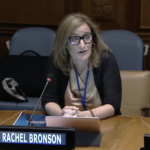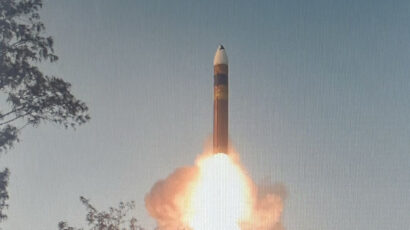The merits of a biochemical framework convention
By Malcolm Dando | October 1, 2008
The Bulletin has been hosting an engaging roundtable discussion on the “The Military Application of Neuroscience Research,” during which neuroscientist Christopher Green challenged the notion that “traditional arms control approaches could be relevant to this domain.” Referring to the recent National Academies study that he chaired, Military and Intelligence Methodology for Emergent Neurophysiological and Cognitive/Neural Science Research in the Next Two Decades, he wrote: “The study does not address arms control issues directly, yet implicit is ample evidence that in the next 20 years, the pace of development of neuroscience technologies related to the military and intelligence communities will swamp traditional arms control measures.”
You do not have to agree with these views to see the value of thinking anew about arms control agreements. Indeed, I don’t agree that there is such a thing as traditional arms control, yet I welcome new thinking about the subject. International relations scholar Stuart Croft was correct to argue in Strategies of Arms Control: A History and Typology(1996) that arms control and disarmament mechanisms have evolved over time as the international community has faced novel problems. For example, framework conventions are a comparatively new technique designed to deal with complex problems requiring multilateral solutions.
In addition to the well-known deficiencies of the BWC and the CWC, neither effectively addresses research or criminalizes individuals for breaking the conventions’ prohibitions. Founding a framework convention to deal more effectively with scientific and technological change could present a way forward.”
It was precisely the potential value of such a framework convention in helping to prevent the hostile use of the life sciences that was under discussion at a workshop at the University of Bath in mid-September. The meeting, “Toward a Framework Convention on Biochemical Controls: Addressing Conceptual and Practical Issues,” included participants from Austria, Germany, the United States, and Britain, who represented an array of expertises, including arms control and disarmament specialists, lawyers interested in framework conventions, political scientists, and ethicists. Many of the participants had never met before and brought widely differing perspectives to bear on the issue under discussion.
The workshop began with a review of the rapid advances being made in the life sciences, for example, in synthetic biology, and in associated converging technologies, such as nanotechnology. These scientific and technological advancements contrasted sharply with the very slow rate of development of the chemical and biological control regime. Could a framework convention better match the rate of scientific and technological change? And if such a convention could be useful, how might it be brought into existence?
The discussion included several presentations on the strengths and weaknesses of active framework conventions. Bonn, Germany, scholar Daniel Klein described the founding and the evolution of the Convention on Biological Diversity, outlining how dissatisfaction with isolated agreements, such as the Convention to Regulate International Trade in Endangered Species, led to the development of an umbrella convention that entered into force in 1993, which led to the negotiation of the Cartagena Protocol on Biosafety in 2003. Cambridge scholar Joanna Depladge similarly reviewed the evolution of the climate change regime. The discussions then moved to a review of the key features of framework conventions and the extent to which they can vary to deal with different contingencies. The group addressed two main questions: What would a coherent set of agreements under a biochemical framework convention look like? And what aspects might be advantageous to have and be practical to pursue?
With convergent technologies, such as biotechnology, nanotechnology, and the cognitive sciences, driving a scientific and technological revolution that could increase the capability to harm as well as benefit society, it is not difficult to see the problems with the present control systems. In addition to the well-known deficiencies of the Biological and Toxin Weapons Convention and the Chemical Weapons Convention, neither effectively addresses research or criminalizes individuals for breaking the conventions’ prohibitions. And they don’t come close to dealing with the outer reaches of the potential of nanotechnology and synthetic biology.
Founding a framework convention to deal more effectively with scientific and technological change could present a way forward. However, Sussex scholar Daniel Feakes sounded a note of caution. Feakes, who recounted the 12 years of work on the Harvard-Sussex convention on criminalizing individuals involved in chemical and biological weapons development, warned that the challenges of implementing a convention were considerable, even if there was a strong conceptual case for it. Just as there had been obstacles in the evolution of the climate change and biological diversity conventions, development of the eminently sensible Harvard-Sussex convention had been a “long slog” and still has a way to go before it gets onto the negotiation agenda of states, Feakes added.
The meeting, which had been funded by the British Academy, closed with a discussion of the scope of the proposed framework convention. If there is a major shift in the capabilities of the life and associated sciences to cause harm and if a framework convention might be a useful way to develop the control regime, should it cover all of the convergent technologies or simply biochemical agents that could interfere with basic physiological processes?
Though the idea of a framework convention would likely take years to develop, the meeting, and its interdisciplinary range of participants, began the difficult task of looking forward and investigating how the future might best be shaped. It reminded me a meeting of academics I attended some 20 years ago that dealt with the topic of nuclear arms control. A diplomat in attendance told the academics that they had little chance of affecting the day-to-day decisions of government through their actions, but he said that they might well be able to affect how practitioners conceived of their day-to-day problems in future years. In this sense, the meeting’s participants took the first steps toward a new consensus that should help to form the basis of scientific conduct for generations to come. The need for further analysis of the issue was clear to those involved, and they are considering how to carry the discussion forward.
Together, we make the world safer.
The Bulletin elevates expert voices above the noise. But as an independent nonprofit organization, our operations depend on the support of readers like you. Help us continue to deliver quality journalism that holds leaders accountable. Your support of our work at any level is important. In return, we promise our coverage will be understandable, influential, vigilant, solution-oriented, and fair-minded. Together we can make a difference.
Topics: Biosecurity, Columnists















